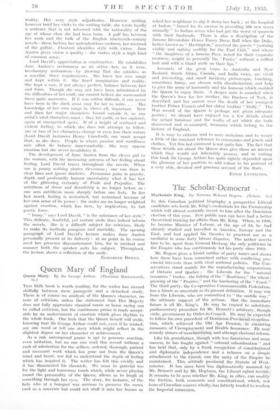The Scholar-Democrat .
Mackenzie King. By Norman McLeod Rogers. (Nelson. 5s.)
IN this Canadian political biography a prospective Liberal candidate sets forth Mr. King's credentials for the Premiership which will almost certainly revert to him after the Dominion election of this year. Few public men can have had a better theoretical training for affairs than Mr. King. When, in 1909, he became Minister of Labour, at the age of 34, he had already studied and travelled in America, Europe and the East, and had applied his theories to practical use as a' mediator in some forty labour disputes. The author asserts him to be, apart from General Hertzog, the only politician in the Empire who has continuously led his party since 1910.
Mr. Rogers gives a broad outline of party issues and shows how these have been concerned rather with conflicting pro- vincial interests than with rival national policies. The Con- servatives stand mainly for the manufacturing corporations of Ontario and Quebec ; the Liberals for the " natural resources " trades—the fishing of the " Maritimes," the wheat-i growing of the " Prairies," and the lumbering of the " Coast." The third party, the Co-operative Commonwealth Federation, has a future as uncertain a§ its present definition. It may win from the Liberals, who are committed to "the middle way," the ultimate support of the artisan. But the „immediate future is all Mr. King's.. He May be trusted to substitute parliamentary procedure for Mr. Berinett's arbitrary, though' virile, government by Order-in-Council. He may be expected to follow his own precedent of Dominion-Provincial co-ordina- tion, which achieved the Old Age Pension, in ex.' etiting measures of Unemployment and Health Insurance. He may remedy abuses of merchandizing, and attempt electoral reform.
Like his grandfather, though with less fanaticism and more success, he has fought against " colonial subordination " and has held that, only by a frank recognition of constitutional and diplomatic independence and a reliance on a Simple attachment to the Crown, can the unity of the Empire be maintained. This attitude produced the Statute of West- minster. It has since been less diplomatically assumed by Mr. Bennett•and by Mr. Hepburn, the Liberal enfant terrible.11 It remains to be seen whether Mr. King, in office, can modify' the friction, both economic and constitutional, which, not born of Canadian sources wholly, has latterly tended to weaken the Imperial connexion.










































 Previous page
Previous page